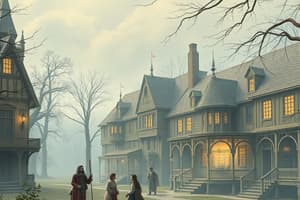Podcast
Questions and Answers
What was the main source of conflict between the narrator and Wilson?
What was the main source of conflict between the narrator and Wilson?
- A rivalry in academics
- Their competition and struggle for superiority (correct)
- Their differing opinions on sports
- Wilson's insistence on following orders
How did the narrator feel about Wilson despite their rivalry?
How did the narrator feel about Wilson despite their rivalry?
- He was indifferent to Wilson.
- He wished to eliminate him.
- He hated him completely.
- He had respect and interest in him. (correct)
What did Wilson’s inability to raise his voice indicate about his character?
What did Wilson’s inability to raise his voice indicate about his character?
- He was physically weak and lacked dominance. (correct)
- He was submissive and wouldn't stand up for himself.
- He was clever and strategic in evading conflict.
- He had a unique strength that belied his voice.
What can be inferred about Wilson’s actions of copying the narrator?
What can be inferred about Wilson’s actions of copying the narrator?
What psychological conflict does the narrator experience regarding Wilson?
What psychological conflict does the narrator experience regarding Wilson?
How did the narrator view Wilson in relation to their own identity?
How did the narrator view Wilson in relation to their own identity?
What was Wilson's apparent motivation in their competition?
What was Wilson's apparent motivation in their competition?
What role did peer influence play in the narrator's rivalry with Wilson?
What role did peer influence play in the narrator's rivalry with Wilson?
What did the narrator believe was the cause of Wilson's behavior?
What did the narrator believe was the cause of Wilson's behavior?
How did the narrator react to Wilson's appearance in the hall?
How did the narrator react to Wilson's appearance in the hall?
What lifestyle did the narrator lead during his time at Eton?
What lifestyle did the narrator lead during his time at Eton?
What significant event occurred during the narrator's party at Oxford?
What significant event occurred during the narrator's party at Oxford?
What does the narrator's experience at Oxford primarily reveal about his character?
What does the narrator's experience at Oxford primarily reveal about his character?
What kind of conflict does the narrator experience regarding his identity?
What kind of conflict does the narrator experience regarding his identity?
How does the narrator's relationship with peers influence his choices?
How does the narrator's relationship with peers influence his choices?
What does the narrator's decision to leave the first school indicate about his character?
What does the narrator's decision to leave the first school indicate about his character?
What was the primary consequence of William Wilson's actions towards Glendinning?
What was the primary consequence of William Wilson's actions towards Glendinning?
How did William Wilson’s actions reflect a psychological conflict within him?
How did William Wilson’s actions reflect a psychological conflict within him?
What does William Wilson’s behavior exemplify regarding the duality of human nature?
What does William Wilson’s behavior exemplify regarding the duality of human nature?
What does William Wilson’s identity reveal about the influence of his peers?
What does William Wilson’s identity reveal about the influence of his peers?
What emotion primarily dominated William Wilson when he realized the impact of his actions on Glendinning?
What emotion primarily dominated William Wilson when he realized the impact of his actions on Glendinning?
What lesson can be drawn about the nature of morality from William Wilson’s experience?
What lesson can be drawn about the nature of morality from William Wilson’s experience?
Which aspect of human nature is highlighted through the character of William Wilson?
Which aspect of human nature is highlighted through the character of William Wilson?
What was the impact of Glendinning's character on Wilson's decision to cheat?
What was the impact of Glendinning's character on Wilson's decision to cheat?
Flashcards
William Wilson's copying
William Wilson's copying
Wilson meticulously mimicked the narrator's walk, voice, mannerisms, and habits.
Narrator's abandonment of school
Narrator's abandonment of school
The narrator, disturbed by the events surrounding Wilson, left the school permanently.
Secret party and encounter
Secret party and encounter
The narrator hosted a party and was confronted by a mysterious figure who introduced himself as "William Wilson" with a warning.
Search for Wilson
Search for Wilson
Signup and view all the flashcards
Wastful time at Eton
Wastful time at Eton
Signup and view all the flashcards
Oxford and cheating
Oxford and cheating
Signup and view all the flashcards
Family accident
Family accident
Signup and view all the flashcards
Mysterious visitor
Mysterious visitor
Signup and view all the flashcards
Wilson's Opposition
Wilson's Opposition
Signup and view all the flashcards
Narrator's Fear of Wilson
Narrator's Fear of Wilson
Signup and view all the flashcards
Wilson's Sympathy
Wilson's Sympathy
Signup and view all the flashcards
Identical Birthdates
Identical Birthdates
Signup and view all the flashcards
Public Quarrels
Public Quarrels
Signup and view all the flashcards
Wilson's Voice Weakness
Wilson's Voice Weakness
Signup and view all the flashcards
Mimicry
Mimicry
Signup and view all the flashcards
Narrator's Strategy
Narrator's Strategy
Signup and view all the flashcards
William Wilson's actions
William Wilson's actions
Signup and view all the flashcards
Glendinning's character
Glendinning's character
Signup and view all the flashcards
Secret cheating
Secret cheating
Signup and view all the flashcards
Wilson's guilt
Wilson's guilt
Signup and view all the flashcards
Unforeseen intervention
Unforeseen intervention
Signup and view all the flashcards
Stranger's advice
Stranger's advice
Signup and view all the flashcards
Financial ruin
Financial ruin
Signup and view all the flashcards
Exposure and arrest
Exposure and arrest
Signup and view all the flashcards
Study Notes
William Wilson by Edgar Allan Poe
- William Wilson is ashamed of his real name and past actions, now filled with misery.
- Wilson suffered a sudden and complete loss of good intentions, transitioning directly from dishonesty to terrible crimes.
- He seeks sympathy and pity for the severity of his temptation
- Wilson's family history includes strong imaginations, uncontrolled emotions, and often violent temperaments.
- Wilson had considerable freedom as a child and adolescent, due to his family's similar weaknesses.
- Wilson experienced a significant event at school, in which another boy with the same first name, surname, and birthday as Wilson strongly opposed him, sparking intense competition and rivalry.
- Wilson has an unusual and deep-seated rivalry with another boy in school with the same name as himself.
- They are remarkably alike, in voice, appearance, and mannerisms.
- Wilson's rival, also named William Wilson, copies his mannerisms and voice, mirroring a disturbing reflection of Wilson himself.
- Wilson felt immense fear and a sense of inadequacy against his rival.
- Wilson's competitor, William Wilson, was present at school on the exact day as him, born on the same date.
- The rival's behavior bothered and threatened Wilson, even after he's left school.
- Wilson's enemy copies his appearance, manner, etc,
- Wilson has a troubled and violent past, connected with guilt, temptation, and crime.
- The rival is referred to in the story as Wilson, and the main character, is also called by this name and is the main subject of the story.
- Wilson struggled and sought to defeat his rival.
- Wilson confesses to cheating at cards and mistreating a fellow student, Glendinning.
- Wilson experiences more disturbing encounters with his rival, including in Paris, Rome, Vienna, and Moscow.
- Wilson's rival's ghost interferes in his adult life.
- They engage in sword fighting in a social setting, in Rome.
- The protagonist seems to destroy his rival or identical twin, William Wilson, at the end of the story.
- The story's conclusion shows the antagonist's death is due to the protagonist or murderer of his rival named William Wilson.
- It is revealed that the killer and victim are one and the same.
Studying That Suits You
Use AI to generate personalized quizzes and flashcards to suit your learning preferences.




